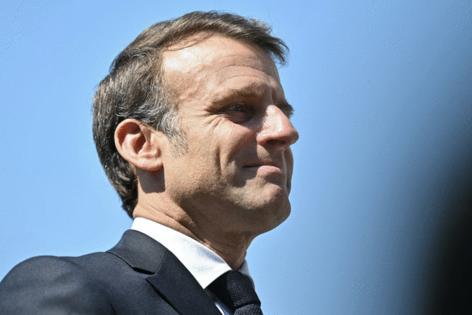France's power brokers jockey as Macron seeks a coalition
Published in News & Features
PARIS — Political players aren’t the only ones jockeying to shape the shifting balance of power in a turbulent France.
The country’s business elite is courting the head of the Socialist party, Olivier Faure, who’s seen as a potential replacement for outgoing Prime Minister Sebastien Lecornu and whose party holds a pivotal swing vote in parliament. On Wednesday, Faure attended a dinner with France’s powerful business lobby AFEP, according to people familiar with the matter.
Faure told the business leaders that the political instability that would result from another snap election would be much more damaging to the economy than any of the policy measures backed by the Socialists, such as pausing President Emmanuel Macron’s pension reform that raised the retirement age, said one of the people, who spoke on the condition of anonymity.
Faure’s chances of becoming prime minister are slim. But after Macron called a snap election last year following a crushing defeat in a vote for the European Parliament, the French National Assembly was fragmented and the center diminished. That left no political group with a majority and made the Socialists kingmakers in any attempt to form a government that doesn’t include the far right.
The Socialist Party didn’t respond to a request for comment and the AFEP declined to comment.
Macron said he would name a new prime minister by Friday evening — a decision that will define the rest of his tenure as president and will put the stability of France and its economy in the balance. The new premier will need to propose a 2026 budget by Monday in order to get the legislation adopted by the end of the year through the normal process. Otherwise the National Assembly will need to pass an emergency bill to keep the government funded.
Macron has so far sidestepped another snap election after Lecornu’s surprise resignation earlier in the week, which he blamed on parliamentary gridlock. Shortly after stepping down, Lecornu was asked by Macron to forge an alliance between rival political groups to secure passage of France’s 2026 budget.
Markets have now largely erased the moves seen amid the political drama earlier this week. The French-German 10-year yield spread — a key measure of risk that rose to the highest level this year on Monday — is now back at 81 basis points, unchanged this week. Meanwhile France’s CAC 40 is just 0.5% lower since last Friday’s close.
The outgoing prime minister delivered a draft policy framework midweek and has now taken a back seat while Macron quietly fine-tunes it as rival factions push their own candidates and agendas behind the scenes, according to people familiar with the matter.
Front and center are discussions between Macron loyalists and Socialists, which wield outsized leverage in parliament. The Socialists have demanded that Macron not only appoint a leftist premier but that the person be open to significant reversals of the president’s economic agenda, including a suspension of his legacy-defining 2023 pension reform, as well as tax increases for the rich.
Macron invited political parties from the center left to the center right to a meeting at the Elysee on Friday afternoon, Marine Tondelier, head of the Green party, said on TF1 television Friday morning.
Intense behind-the-scenes conversations between members of the president’s centrist bloc and the Socialists have taken place in TV studio corridors, over coffees, and by phone, the people said. But stitching together an accord among political groups from the center left to the center right — which Macron needs to do — is proving difficult.
One senior Socialist said the enthusiasm that followed outgoing Education Minister Elisabeth Borne’s suggestion that the president’s party would be willing to pause the pension reform has largely dissipated, leaving negotiations at a standstill.
“The Socialist Party will not participate in a government whose prime minister is not left-wing; we want a left-wing premier, with a left-wing government, so that there can be a break with the past,” Socialist spokesperson Dieynaba Diop said on French TV Thursday.
Still, some in Macron’s camp see progress, including Eleonore Caroit, a senior lawmaker from the president’s party.
“Political parties are moving toward a compromise that will allow us to have a government in the next hours,” she said in an interview. “It looked incredibly difficult to build a government but now it looks increasingly possible.”
Caroit said that the tone shifted after all political parties — except the far-right National Rally and the far-left France Unbowed — realized how close France was to another snap election. “We saw the precipice and walked back,” she said.
The looming deadline for the new premier’s appointment has also rattled the center-right Republicans, where divisions have intensified over what stance to take.
Similar tensions are emerging within Marine Le Pen’s far-right National Rally, where some members advocate partnering with the conservative Republican party to expand their leverage and political reach, while others warn such a move would dilute the party’s identity.
Political analysts say the frenzied politicking reflects how parties are already positioning themselves for the 2027 presidential race, blurring what remains of France’s traditional ideological lines.
“It really is a crisis of the political class that is paralyzed and jittery as the 2027 presidential election approaches,” said Marie-Pierre de Bailliencourt, the head of the Paris-based Institut Montaigne think tank. “We are witnessing the final convulsion of a dying political class.”
---------
—With assistance from Andrea Palasciano, Angelina Rascouet, Tara Patel, Benoit Berthelot, David Goodman, Gaspard Sebag and Alan Katz.
©2025 Bloomberg L.P. Visit bloomberg.com. Distributed by Tribune Content Agency, LLC.







Comments